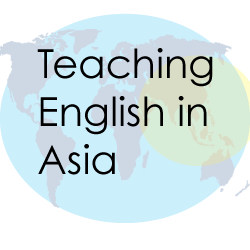 Advocacy in Language Education
Advocacy in Language Education
 From a North American perspective, second language teachers often find themselves defending the value of their subject; they often find themselves answering the question “Why should I learn a second language? When will I need it?”
From a North American perspective, second language teachers often find themselves defending the value of their subject; they often find themselves answering the question “Why should I learn a second language? When will I need it?”
Learning a second language is important and teachers and learners must by prepared to answer these questions lest the practice of language teaching be lost altogether. In this section we will examine why advocacy is needed and just how teachers and people in the field of second languages can go about advocating for second language education.
Why is there a need for advocacy?
English has grown in leaps and bounds around the world; people from all over make a concentrated effort to learn English as it opens so many doors. What happens to the people who speak English as a first language? Do they not need to learn another language? Unfortunately, this is a sentiment that has also grown in recent years; living in North America creates a bubble sensation for many people who feel that since everyone else is learning English, they have no need to learn a second language, let alone a third or fourth. This is a foreign concept in Europe, where some students leave their school years with as many as four languages and most leave with at least a second language. In order for Canada to increase the language capabilities of its citizens, there is a need for advocacy; the benefits of learning a language must be more widely known so that eventually, one will no longer hear the question “Why should I learn a second language?”
back to top
What are the benefits of learning a second language?
In a world where an awareness and understanding of the global community is increasingly important, there is no doubt that learning a language is beneficial. The benefits are many and range from cognitive affects to increased career and travel opportunities.
 Benefits of learning a second language:
Benefits of learning a second language:
- Cognitive benefits- SL Learning:
- Has a positive effect on intellectual growth.
- Enriches and enhances a child's mental development.
- Leaves students with more flexibility in thinking, greater sensitivity to language, and a better ear for listening.
- Improves a child's understanding and literacy skills in his/her native language.
- Helps to build self confidence and social skills
- School, career and travel benefits- SL Learning:
- Gives a student a head start in language requirements for college or University.
- Increases job opportunities in many careers where knowing another language is a real asset.
- Knowing another language can open the door to new travel or study abroad experiences.
- Promoting global understanding- SL Learning:
- Encourages cultural awareness and appreciation
- Opens the door to other cultures and helps a child understand and appreciate people from other countries.
- Teaches students to look at the world around them from many viewpoints
- Provides opportunities for students to reflect on their own heritage and culture
back to top

1. Read the chart below. Are there any other stakeholders that should be added? Do you agree with all of the arguments presented? Make changes accordingly.
2. Create a venn diagram to show which purposes or values different groups share/don't share.
3. Decide what you, as a teacher, might do to help better inform different groups about the others' perspective.
4. Give some ideas about how you might work with a school administrator to help better educate him or her.
5. Develop an advocacy forum to help a specific group develop a better understanding of why learning a SL, and your SL in particular is valuable.
For parents
|
For Students
|
For Government or Province
|
For Schools, Communities, and Districts
|
For administrators:
|
|
How can advocacy be carried out at different education levels?
Advocacy of second language education can be done differently at different stages of learners’ education. Each stage brings a different level of understanding for both parents and students and different aspects of language can be emphasized at each stage of development:
- Elementary: Parents of students in their first few years of formal education can have their focus drawn towards the cognitive benefits of learning a second language. Knowing that learning a second language can help their children in other subjects will go far in encouraging them. It is also common knowledge that children learn languages easier and quicker than adults; why not have children learn a language when it is almost effortless?
- Secondary: Parents of students in secondary education can have their attention focused not only on the cognitive benefits of language learning, but also on the educational and professional advantages that can result from having a second language. Students are also much more involved in their educational decision making at this point, so advocacy can focus on the travel and study abroad benefits.
- Post-secondary: Potential students of second languages in post-secondary education settings can have their attention focused on the travel, study abroad and professional benefits, depending on each person’s personal focus.
back to top

Foreign Language Advocacy: Become an Effective Advocator in 8 Steps
http://www.actfl.org/i4a/pages/index.cfm?pageid=3656
Globe-Gate Research. Foreign Languages: an Essential Core Experience. http://www.utm.edu/departments/french/flsat.html









